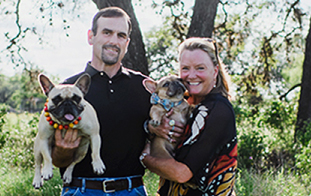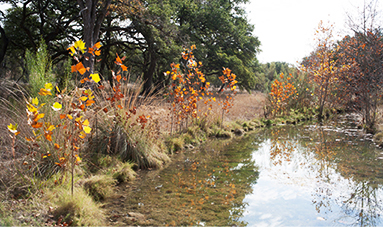Beginning in 2002, the owners of the C. L. Browning Ranch sponsored a multidimensional land-stewardship program incorporating prescribed burns for soil regeneration; rainwater conservation to promote aquifer recharge and ensure adequate current water supply; expansion of scenic vistas by selective removal of excessive underbrush; and the institution of an arboricultural management program to preserve tree health, enhance landscape aesthetics, increase desirable forms of native wildlife, and protect the habitats of birds such as the golden-cheeked warbler (Dendroica chrysoparia), a migratory species whose nesting territory is limited to the mixed Ashe -juniper and oak woodlands of central Texas, and the great blue heron (Ardea herodias), which breeds in rookeries it builds in waterside trees such as the sycamores on the banks of the ranch’s Honeycut Hollow Creek.

Scott and Colleen Gardner.
To insure the longtime survival of the integrity of the ranch as a single property and its future environmentally focused stewardship Betsy and Ted Rogers have created in their wills a private land trust with the responsibility of determining its ownership beyond their lifetimes. Such ownership will be tied to the designation of its riparian corridor – the creek and its adjacent lowlands running from south to north through the center of the property – as a conservation zone legally protected from real estate development.

Honeycut Hollow Creek.
